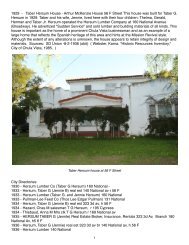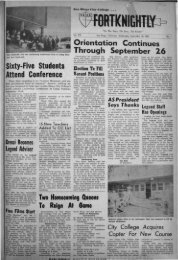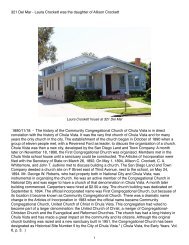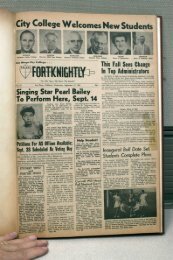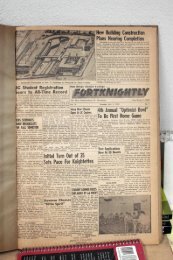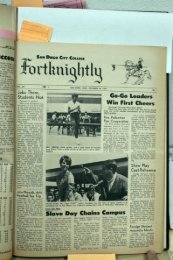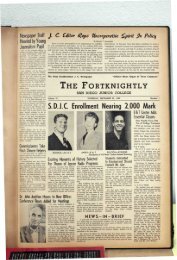doc241 - Schoenherr Home Page in Sunny Chula Vista
doc241 - Schoenherr Home Page in Sunny Chula Vista
doc241 - Schoenherr Home Page in Sunny Chula Vista
You also want an ePaper? Increase the reach of your titles
YUMPU automatically turns print PDFs into web optimized ePapers that Google loves.
<strong>Page</strong> 114<br />
PART II. CHAPTER III. POLITICAL LIFE IN MEXICAN DAYS<br />
Although twenty-three Governors--ten Spanish and thirteen Mexican--ruled California<br />
before the days of American dom<strong>in</strong>ion, only two of these impressed themselves<br />
upon the history of San Diego. Governor Echeandía loved the place so well that he virtually<br />
made it the capital dur<strong>in</strong>g his adm<strong>in</strong>istration, and Governor Pico was himself a<br />
San Diegan <strong>in</strong> whom his neighbors felt considerable pride. Several of the others appeared<br />
for a moment upon the stage of picturesque local life, but few exerted any <strong>in</strong>fluence<br />
upon the course of events <strong>in</strong> this neighborhood. It must be remembered that for<br />
sixty-six years San Diego lived under military rule and that it was not until the establishment<br />
of the pueblo <strong>in</strong> 1835 that civil government became dom<strong>in</strong>ant. Less than a<br />
dozen years then rema<strong>in</strong>ed to the Mexican power, but this brief period was crowded<br />
with <strong>in</strong>terest<strong>in</strong>g political episodes. As we study the record, we are strongly rem<strong>in</strong>ded that<br />
the men of that time were of the same race as those who have made the turbulent politics<br />
of Central and South American states, for there is the same story of mimic wars and<br />
of the rise and fall of ambitious rulers. There were but few people to govern, but relatively<br />
many who desired to govern them, and the energies which Americans have given<br />
to the development of natural resources the Mexicans preferred to spend on the stormy<br />
field of politics.<br />
When the Spanish flag went down, and gave place to the emblem of Mexico, on<br />
April 20, 1822, the people of San Diego submitted gracefully, but without enthusiasm.<br />
Only far echoes of the revolutionary struggle had reached them dur<strong>in</strong>g the previous<br />
decade and their sympathies clung fondly to the Spanish tradition of the country. It is<br />
related that there was no flagstaff upon which to hoist the new colors; that the soldiers<br />
grumbled because there was no distribution of money; and that the next day they cut off<br />
their queues as an expression of their disgust. In December, the imperial commissioner,<br />
charged with the change of government <strong>in</strong> Upper California, stopped <strong>in</strong> San Diego for a<br />
week on his way home, but there is noth<strong>in</strong>g to show that he transacted any bus<strong>in</strong>ess at<br />
this place. He gambled with a<br />
<strong>Page</strong> 115<br />
[Pio Pico]<br />
rollick<strong>in</strong>g priest, named Fernandez, quarreled with Santiago Argüello about it, and departed<br />
<strong>in</strong> an unhappy frame of m<strong>in</strong>d.<br />
It was <strong>in</strong> 1825 that General José María Echeandía, who was both political chief<br />
and military commandant of Upper and Lower California, arrived with a detachment of<br />
soldiers and a number of subord<strong>in</strong>ates and established himself at the Presidio. This was<br />
after the fall of the Emperor Iturbide and at the very outset of the effort to establish republican<br />
<strong>in</strong>stitutions. The task he had undertaken was by no means easy. The troops<br />
were destitute and mut<strong>in</strong>ous; the old Spanish population was still unfriendly to the new<br />
order of th<strong>in</strong>gs, and the region lacked capital and population and was far from prosperous.



